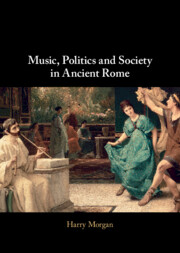Book contents
- Music, Politics and Society in Ancient Rome
- Music, Politics and Society in Ancient Rome
- Copyright page
- Contents
- Figures
- Acknowledgements
- Abbreviations
- Introduction
- 1 The Games of L. Anicius Gallus and the Cultural Politics of Music in the Second Century BCE
- 2 Popular Music and Popular Politics in the Late Republic
- 3 Augustus, Apollo’s Lyre and the Harmony of the Principate
- 4 Nero and the Age of Musomania
- Epilogue
- Bibliography
- Index
4 - Nero and the Age of Musomania
Published online by Cambridge University Press: 24 November 2022
- Music, Politics and Society in Ancient Rome
- Music, Politics and Society in Ancient Rome
- Copyright page
- Contents
- Figures
- Acknowledgements
- Abbreviations
- Introduction
- 1 The Games of L. Anicius Gallus and the Cultural Politics of Music in the Second Century BCE
- 2 Popular Music and Popular Politics in the Late Republic
- 3 Augustus, Apollo’s Lyre and the Harmony of the Principate
- 4 Nero and the Age of Musomania
- Epilogue
- Bibliography
- Index
Summary
This chapter examines the reign of the notorious musician-emperor Nero. It offers a comprehensive survey of the ancient material relating to Nero’s performances, stressing also his important role behind the scenes as producer, composer and choreographer. Building on the recent ‘performative turn’ in Neronian studies, the chapter argues that Nero used music not to satisfy some narcissistic or tyrannical bent, as has traditionally been maintained, but rather as part of a self-conscious strategy for the negotiation and representation of imperial power. Nero’s music-making responded to, and drew energy from, the cultural interests of both the ordinary Roman people and the young metropolitan elite. In this way, Nero succeeded in creating and disseminating an original musical language, which repackaged elements of Greek culture into a distinctly Roman product optimised for popular consumption.
- Type
- Chapter
- Information
- Music, Politics and Society in Ancient Rome , pp. 191 - 238Publisher: Cambridge University PressPrint publication year: 2022

